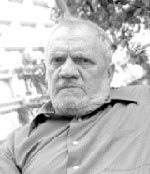
-
 Ugo Ulive
Ugo Ulive
(Uruguay)
Actor, iluminador, director de teatro, director de cine. A partir de 1939 integra el grupo teatral El Galpón, de donde prácticamente salen todos los actores de su obra cinematográfica, que comienza en 1952. Los cortos iniciales le permitieron familiarizarse con ese lenguaje, adaptando a Borges (La espera), tratando temas sociales (La tentativa) o documentando pasos de danza (Pas de deux), todos pertenecientes al campo amateur. Así en 1959, con argumento de Andrés de Armas surge, ya como un cine más profecional, Un vintén p´al Judas; con una historia de tradiciones y ambiciones pequeñas que aporta una visión crítica de la sociedad.
Ulive fue una figura clave del teatro y el cine uruguayos hasta los años sesenta, fecha en que partió, primero a Cuba y luego a Venezuela. Precursor del cine uruguayo, con filmes como Elecciones (co-dirigida con Mario Handler), muy polémica en su momento por la manera de revisar la actividad preelectoral y Como el Uruguay no hay, documental que polemiza con un tono de panfleto revolucionario sobre la sociedad uruguaya y con un formato que incluye animación y montajes de noticieros.
En Cuba filmó con Tomás Gutiérrez Alea (Las doce sillas) y dirigió teatro. En sus más de treinta años de estadía en Venezuela tuvo un papel fundamental en la renovación teatral de aquel país, con una gran obra como dramaturgo, y terminó al frente de la Compañía Nacional de Teatro de Venezuela.

Ugo Ulive is an Uruguayan film director, actor, lighting technician and theater director. Since 1939, he joined the theater group El Galpón, from where has come most of the actors of his film work, which began in 1952. His first short allowed him to familiarize with the film language, adapting Jorge Luis Borges´s work (La espera), dealing with social issues (La tentativa) or documenting dance steps (Pas de deux), all of which belonged to the amateur cinema. In this way in 1959 with a screenplay by Andrés de Armas, he directed a more professional film, Un vintén p´al Judas; which tells a story of tradition and little ambitions that advanced a critical vision of society.
Ulive was a key figure of the Uruguayan film and theater until the 1960s, when he traveled to Cuba first and then to Venezuela. He was a Forerunner of Uruguayan cinema, with feature films as Elecciones (codirected with Mario Handler), very polemic in its moment by the way in which registered the pre-election activities and Como el Uruguay no hay, a documentary that discussed about the Uruguayan society with a style of revolutionary pamphlet and a format that includes animation and montages of newsreel footage.
In Cuba he worked with Tomás Gutiérrez Alea (Las doce sillas) and directed theater. During his more than thirty years of stay in Venezuela, he played an important role in the renovation of that country theater, with a great work as playwright, and even directed the Venezuelan National Theater.

Referencias en el Portal:
La espera, 1951, Dirección
La tentativa, 1953, Dirección
Pas de deux, 1954, Dirección
Un vintén p'al judas, 1959, Dirección
Como el Uruguay no hay dos, 1960, Dirección
Las doce sillas, 1962, Guión
Crónica cubana, 1963, Dirección
Elecciones, 1966, Dirección
Caracas dos o tres cosas (Caracas 2 o 3 cosas), 1969, Dirección
¡Basta¡, 1970, Dirección
T.0.3, 1972, Dirección

